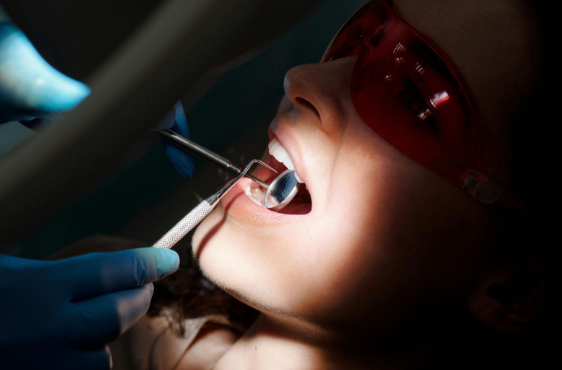Gateway Family Dental Blog
Beyond Brushing: The Role of Nutrition in Achieving a Healthy Smile

Most people focus on brushing, flossing, and regular dental checkups to keep a healthy smile. While these habits are definitely important, they are only part of the equation. What you eat also plays a big part in your oral health as it influences everything from enamel strength to gum health and even your risk of cavities.
Here’s how your diet can nourish your body and fuel a strong, healthy smile.
How Nutrition Affects Your Teeth and Gums
Your teeth and gums rely on essential vitamins and minerals to both stay healthy and resist decay. Because of this, every bite you take can either support or weaken your oral health. Sugary and acidic foods, for example, create an environment where harmful bacteria thrive, leading to cavities and gum disease. On the other hand, nutrient-rich foods provide your body with the tools it needs to build strong enamel, fight infections, and maintain a balanced pH in the mouth.
The Power of Calcium and Phosphorus
Calcium is often the first nutrient that comes to mind when we think about strong teeth. This mineral helps to reinforce enamel, the outer protective layer of your teeth, by making it more resistant to decay. Dairy products like milk, cheese, and yogurt are well-known sources of calcium, but you can also get it from leafy greens, almonds, and fortified plant-based milks.
Phosphorus works hand in hand with calcium to keep your teeth strong. Foods like fish, eggs, nuts, and beans are excellent sources of phosphorus, helping to rebuild and protect tooth enamel that may have been worn down by everyday chewing and exposure to acids.
The Unsung Hero of Oral Health
Even if you consume plenty of calcium and phosphorus, your body needs vitamin D to absorb and use these minerals effectively. Without enough vitamin D, your teeth and bones can weaken, increasing the risk of cavities and gum disease. Sunlight is one of the best natural sources of vitamin D, but you can also get it from fatty fish like salmon and tuna, fortified dairy products, and egg yolks.
How Vitamin C Aids Gum Health
If you’ve ever noticed that your gums feel sore, swollen, or bleed easily, you might not be getting enough vitamin C. This powerful antioxidant is a big help in maintaining strong connective tissue in your gums, which helps prevent gum disease. Citrus fruits like oranges and grapefruits are great sources, but if you’re worried about their acidity affecting your enamel, you can opt for strawberries, bell peppers, or leafy greens instead.
Hydration and Oral Health: Why Water Is Your Best Friend
Water is one of the most overlooked tools for a healthy smile. Staying hydrated helps your mouth produce enough saliva, which is necessary for washing away food particles and neutralizing acids that can cause tooth decay. Saliva also contains minerals like calcium and phosphate, which help strengthen your enamel naturally. Choosing water over sugary drinks like soda or juice can significantly reduce your risk of cavities and dry mouth.
Crunchy Fruits and Vegetables
Eating crisp fruits and vegetables like apples, carrots, and celery can have a natural cleaning effect on your teeth, making them like a natural toothbrush. Their fibrous texture helps scrub away plaque and food debris while stimulating saliva production. Plus, they have lots of vitamins that contribute to overall oral health, making them a great snack for both kids and adults.
The Impact of Sugar and Acidic Foods
While some foods protect your teeth, some do the exact opposite. Sugary snacks and beverages fuel harmful bacteria in your mouth, leading to acid production that weakens enamel. Sticky candies and sodas are particularly problematic, as they cling to your teeth and prolong acid exposure. Acidic foods like citrus fruits, tomatoes, and vinegar-based dressings can also wear down enamel over time. While you don’t have to eliminate these foods entirely, it’s best to consume them in moderation and rinse your mouth with water afterward.
The Link Between Diet and Bad Breath
If you struggle with persistent bad breath, your diet might be playing a bigger role than you realize. Certain foods, like garlic and onions, contain sulfur compounds that linger in your mouth and bloodstream, causing an unpleasant odor. Meanwhile, a diet high in sugary or processed foods can promote bacterial growth that leads to halitosis. Eating fiber-rich fruits and vegetables, drinking plenty of water, and maintaining a well-balanced diet can help keep your breath fresh naturally.
Nutrients That Support a Healthy Microbiome
Your mouth is home to millions of bacteria, and while some are good for you, some are harmful. A well-balanced diet supports a healthy oral microbiome, which keeps the good bacteria in check and prevents an overgrowth of the bad ones. Probiotic-rich foods such as yogurt and fermented vegetables can help keep the balance of bacteria in your mouth healthy, which reduces the risk of both cavities and gum disease.
Using Omega-3 Fatty Acids for Gum Health
Omega-3 fatty acids, found in fish, flaxseeds, and walnuts, have powerful anti-inflammatory properties that can benefit your gums. Including these healthy fats in your diet can therefore support your oral and overall health in the long run.
At
Gateway Family Dentistry, we can keep your smile the absolute brightest.
Contact us for more nutritional information to help your teeth, or to schedule an appointment today!




